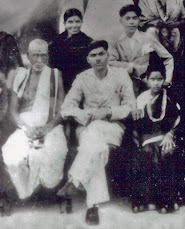Necessarily, one thing is related to the other. But the relationship may not be very direct nor immediately apparent.
I examine the relationship between my thought and the power behind my corresponding action. If I am thinking clearly about some matter, it does not follow that I can effectively put it into action. I may be absolutely clear in my head that I need not be afraid in the dark and being alone near a graveyard, but in actual fact, my whole body might tremble with fear. This in turn might seriously hinder the clarity of my perception and my thought.
I reflect on the nature of other emotions like anger, depression, frustration, passion and find that these emotions tend to dominate over thought, perception and action.
Personal power is relatively independent of intellectual capacity by itself. The effective leader in a group is often the emotionally strong person irrespective of his intellectual capacity.
I have said ‘emotionally strong’, not necessarily emotionally stable. Incidentally, it is good for the training of the body to be aware of, and experience nuances and terminology like strength, stability and so on. I said that emotions like anger, fear, etc. disturb clarity of thought and precision of action. But when any of these emotions reach a high pitch, and can be sustained at that level for considerable durations of time, very effective actions can take place. The emotion of hate dominating Hitler raised hell for over a decade on this earth. In the height of patriotic or altruistic fervour extraordinary feats of heroism have been achieved.
Moreover, I observe that emotion, more than thought has the property of diffusion; that is to say that the emotion of one person can more rapidly infect others and draw them into its orbit, and can by process of reinforcement reach greater and greater intensity. Thus in a group the strong emotion has an autonomous organizing power of its own, and often thoughts, perceptions and actions become its aides.
It appears, therefore, that for all practical purposes the heart rules the head and hands. When there are no conflicts in the heart, there are likely to be no conflicts in the head and hands. For instance, if the emotions of hate, fear and compassion are in the same breast, one may become a fit subject for a novel but certainly not an effective leader of himself or others.
The majority of people, however, do not represent single sustained emotions.
The problem, therefore, arises for me, who am a mixture of these emotions. I recognise that emotions of anger, hate etc., disturb my perceptions, thoughts and actions. I am mentally clear that I do not like anger, fear or hate and know that they interfere with my efficiency I know that these emotions appear to invade me without so much as a ‘by your leave’. All this intellectual clarity does not seem to help much. I find that my mind is a camp follower of my emotions, and always ready to supply the supporting arguments for its maintenance. I find that mastery of emotions is the determining factor, and that filling my mind with intellectual wisdom does not confer power of action - transforming action.
I know also that these emotions are not mysteries whose nature I am not even allowed to question and investigate. I know that emotions are expressed through my body and its parts. I must therefore observe and study what exactly are my own bodily reactions to which I give the name of anger, etc. and I must learn to trace in myself the chain of reactions to which the name of a particular emotion is given, and skillfully reorganize the bits and pieces, train the body as lovingly as a horseman trains his sensitive horse.
Next time I get angry, I must either at the beginning or in the middle or at the end or between two attacks, sit down to look at it, same way my garage engineer looks at my rattling car.
I get angry. The first thing I observe is that I find I am making excuses and discovering or asserting reasons. In a minute I can see that these reasons are really excuses; I can see that the same situation which has provoked anger in me does not do the same for others; that the same situation occurring at another time does not provoke anger; that I am liable to get angry on many other occasion too: that if one person calls me a fool I am flattered but flustered if another person says so; that my anger seems to be nowhere if the situation occurs in front of a senior person or on a sacred occasion when showing anger is taboo; and so on.
Therefore, this precious, personal anger of mine is merely the capacity of my body to display the drama of anger; and that it loves the drama and seeks as many opportunities as possible to express itself; and also I find myself giving certificates to myself - ‘Oh, I am a very irritable fellow ; all my friends know it; and my family shudders at my temper and walk like mice in my presence’ and so on; and finally to cap it all - there are novels and psychology books to show that anger is an unavoidable misfortune of all average or normal persons, and I definitely intend to be ‘normal’! Thus, an important link in the chain of reactions underlying anger is the intellectual lawyer behind my anger.
The next step is to go over my body, its parts and functions in the process of anger, in as detailed a manner as does the garage engineer with the rattling car. My words tend to become rude; my voice becomes high; my face goes red; my heart beats faster; my breathing becomes deep or shallow; my limbs tremble; and so on. Next I can also observe the duration for which these reactions last. Next I can note how easily this reaction can be elicited. I can note whether the reactions subside rapidly or have long-drawn-out effects like sulking for a couple of days; I can note down what and how wide an effect it has on the other persons around me. Knowing that my body is helplessly acting out the drama written for it, I must in my imagination rearrange the drama written for it, and try to break this chain at its weakest link with the strongest force at my disposal. For instance, I can cut out giving reasons or finding reasons for my anger, knowing the futility; knowing that reasons or no reasons, that it is my body that is getting damaged in the process; next I might begin cutting out the periods of sulks and other after-effects; whatever happens, I shall not utter rude words at the next occasion and so on.
Thus maintaining a logbook as it were, and cutting one small link in the sequence, you will be surprised to see the results. This may not ensure absolute immunity but certainly gives you greater mastery.
The sincerity with which you treat your body as an engineer or a scientist, and not like a barbarian, ensures great rewards. Getting rid of the illusion that you know all about these things from having read a book on physiology, on the analogy of talking about lions and knowing them, will enable you to see that it is your body that requires the learning and that your body is fitted with all that is necessary to study and correct itself and it is not the professor of psychology or the textbook that needs correction, but yourself, will help you to come to the root of the matter.
Mastering emotions is an engineering problem; and you are the engineer.
Without mastery of emotions I will be like a warrior in shining armour that goes to battle on a horse that he does not understand and that topples him at the first clash of arms and the warrior finds himself fighting his horse more than he is fighting the enemy.











